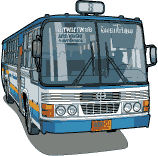Area Contract: Gross Cost
When an authority issues a contract to a bus operator giving him the exclusive right to operate bus services in an area that forms all or a substantial part of a city, it’s described as an area contract.
Normally these contracts are awarded on the basis of competitive tenders. During a transition period, however, negotiated area contracts may be awarded on the basis of negotiation with an incumbent bus operator.
If the financial basis of the contract is payment to the operator of a specified sum to provide the specified service for a specified period, with all revenue collected being for the account of the authority, it’s known as a gross-cost contract.
An area contract will be appropriate if:
- The city has a number of relatively self-contained areas. (If the total number of buses in the city is fewer than 500 then there should be only one citywide area.)
- The authority wishes the operator to undertake bus service planning for the area (normally this would be subject to approval by the authority).
- The authority wishes the operator to establish himself and be identified as the bus system provider for the area.
A gross-cost contract will be appropriate if:
- The authority wishes to avoid on-street competition for passengers.
- The authority wishes to provide free or discounted interchange between all routes in all areas in order to minimize route duplication
- A high percentage of revenue is collected off-bus.
The disadvantages of a gross-cost area-contract
- The operator does not keep the revenue collected and so may not pay sufficient attention to revenue collection.
- The authority must ensure that all revenues are being collected and handed over, requiring constant vigilance and inspection.
- Penalties must be in place both for passengers who do not have tickets and staff who fail to issue tickets.
- The operator is not concerned with the efficient operation of the route.
- Since the number of buses involved is relatively large, the number of bidders is likely to be small.
- It’s difficult to replace a poorly performing operator since a large fleet of buses is involved.
System design for a gross-cost area-contract must take into account:
Selection of Work to be tendered
Legal and regulatory framework
Institutional requirements
Financial aspects
Fares
Vehicle types
Infrastructure requirements
Making the transition
